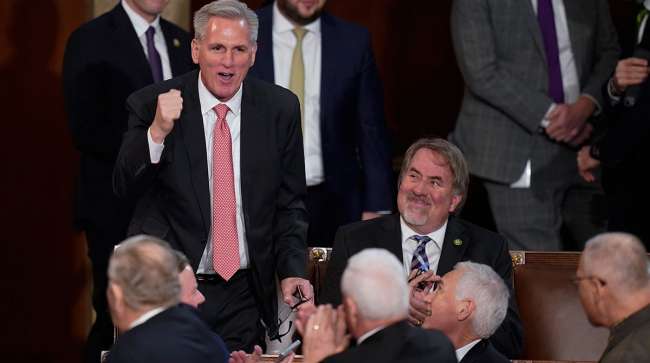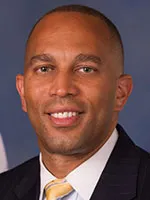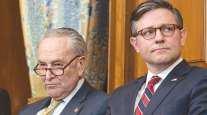Senior Reporter
Speaker Holdup Stalls GOP Agenda

[Stay on top of transportation news: Get TTNews in your inbox.]
Multiple failed attempts in the House of Representatives to solidify Rep. Kevin McCarthy (R-Calif.) as the next Speaker of the House delayed the GOP caucus from kicking off its legislative agenda on time, as every official function in the chamber requires a signoff from the speaker.
Without a speaker, elected officials could not be sworn in, leaving committees that regulate industries such as trucking in limbo. That includes the transportation committee in the House.
It took 15 ballots over four days for McCarthy to win the speaker’s gavel early in the morning of Jan. 7. Other nominees for the speakership in the 118th Congress also were unable to secure the requisite 218 votes.
McCarthy’s nomination stalled amid Republican disagreements; as many as 20 Republicans splintered from their party’s broader backing of McCarthy.

Jeffries
Democrats, meanwhile, unified around Minority Leader Hakeem Jeffries (D-N.Y.).
Proceeding with multiple rounds of ballots to win the chamber’s speakership is a procedural occurrence not seen on Capitol Hill in about a century; a new speaker is typically elected on the first ballot.
The chamber’s voting quandary also raised the possibility that McCarthy’s 20 GOP antagonists would seek high-energy debates over federal government funding parameters, the country’s borrowing authority — otherwise known as a debt ceiling — and any further aid for Ukraine’s armed conflict.
President Joe Biden took aim at the vote for speakership during a trip to Kentucky on Jan. 4 that highlighted funding for an aging Brent Spence Bridge. The president told reporters, “A Congress that can’t function is just embarrassing. We’re the greatest nation in the world. How can that be?”
House Republicans secured the majority after the November midterms. Prior to that election, McCarthy and his leadership circle unveiled the “Commitment to America” platform. Included in the policy proposal was a call to improve freight connectivity along the nation’s supply chains.
Recently, current House Republican leaders sought to push their caucus toward a legislative mindset. Incoming Majority Leader Steve Scalise (R-La.) had expressed optimism about his party’s agenda.
“We understand that developing a good process will lead to better legislative outcomes. Returning to work in person, empowering each committee, moving legislation through regular order, encouraging member input, and allowing adequate time to read legislation will be major priorities of our incoming majority. We are excited to make those principles a reality in the House,” said Scalise.
“We do also recognize that it will take some time for our committees to organize and start moving legislation through regular order. In the meantime, we will begin bringing up meaningful, ‘ready-to-go’ legislation in the House,” the Louisiana Republican continued.

Scalise
One such “ready-to-go” bill on Scalise’s radar is designed to prohibit non-emergency drawdowns of the Strategic Petroleum Reserve if there is no road map for increasing domestic energy production.
Additionally, most House Republicans pledged to ramp up oversight of the Biden administration. Pertaining to transportation policy, senior GOP lawmakers are suggesting an in-depth examination of the $1 trillion Infrastructure Investment and Jobs Act. The IIJA, known as the bipartisan infrastructure law, was enacted in 2021.
A focus for the congressional GOP is a Dec. 16, 2021, memorandum from the Federal Highway Administration suggesting state agencies prioritize maintenance of projects instead of breaking ground on new projects. A recent review of the memo by the Government Accountability Office prompted Republicans to continue to call for its undoing.
“The FHWA memo goes far beyond mere ‘guidance’ from the administration,” said Rep. Sam Graves (R-Mo.) last month. Graves is the transportation committee’s Republican leader. “Since IIJA was signed into law, the administration has repeatedly doubled down on discouraging states from expanding or building new roads they may need, despite this policy being in direct conflict with what Congress intended.”
“Congressional and stakeholder calls for FHWA to rescind its December guidance have been ignored by the administration, which they know has caused significant confusion among states,” Graves continued.
On the other side of the Capitol, the Senate Democrats scheduled legislative affairs to formally begin the week of Jan. 23. Both Democrats and Republicans in the upper chamber selected their leaders without controversy. “We have a lot of work ahead of us, so I hope we can find some ways to come together — and not succumb to gridlock — for the good of this chamber and for the good of our country,” Majority Leader Chuck Schumer (D-N.Y.) said Jan. 4.
Want more news? Listen to today's daily briefing above or go here for more info
The start of the new session of Congress led infrastructure stakeholders to renew calls for bipartisanship with federal lawmakers seeking to commence their agenda.
The U.S. Chamber of Commerce was among those groups.
“The Infrastructure Investment and Jobs Act is an excellent case study of how bipartisanship can lead to progress on big initiatives,” said Neil Bradley, the chamber’s executive vice president and chief policy officer, on Jan. 4.




